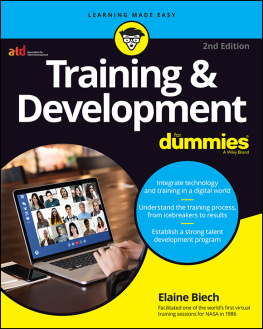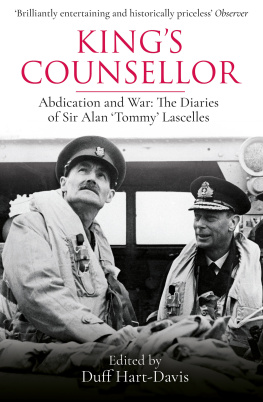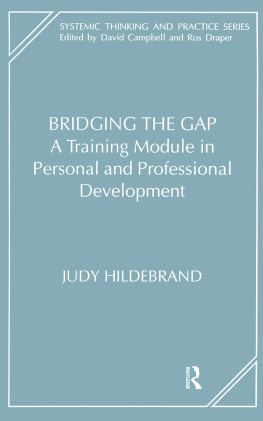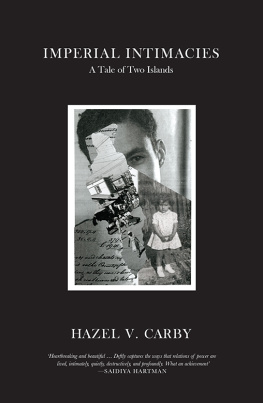PERSONAL DEVELOPMENT IN COUNSELLOR TRAINING
COUNSELLOR TRAINER AND SUPERVISOR SERIES
Series editor: Windy Dryden
Increasingly, counsellors feel the need for professional recognition and guidance as the profession becomes more confidently established.
This new series assembles practical books written by experts in the field and emphasizes the needs both of those training and of those designing and running courses. The focus is on the nature of counselling and how it can best be taught.
Books in the series:
Counselling Supervision: Theory, Skills and Practice
M. Carroll
Self-directed Learning in Counsellor Training
M. Charleton
Issues in Professional Counsellor Training
W. Dryden, I. Horton and D. Mearns
Skills Training for Counselling
F. Inskipp
PERSONAL DEVELOPMENT IN COUNSELLOR TRAINING
SECOND EDITION
Hazel Johns
Hazel Johns 1996, 2002, 2012
First edition published by Cassell in 1996. Reprinted by Cassell in 1998, by Continuum in 2002, by SAGE Publications in 2005, 2006, 2007 (twice), 2008, 2009 (twice), 2010
This second edition published 2012
Apart from any fair dealing for the purposes of research or private study, or criticism or review, as permitted under the Copyright, Designs and Patents Act, 1988, this publication may be reproduced, stored or transmitted in any form, or by any means, only with the prior permission in writing of the publishers, or in the case of reprographic reproduction, in accordance with the terms of licences issued by the Copyright Licensing Agency. Enquiries concerning reproduction outside those terms should be sent to the publishers.
SAGE Publications Ltd
1 Olivers Yard
55 City Road
London EC1Y 1SP
SAGE Publications Inc.
2455 Teller Road
Thousand Oaks, California 91320
SAGE Publications India Pvt Ltd
B 1/I 1 Mohan Cooperative Industrial Area
Mathura Road
New Delhi 110 044
SAGE Publications Asia-Pacific Pte Ltd
3 Church Street
#10-04 Samsung Hub
Singapore 049483
Library of Congress Control Number: 2011930413
British Library Cataloguing in Publication data
A catalogue record for this book is available from the British Library
ISBN 978-0-85702-496-1
ISBN 978-0-85702-497-8 (pbk)
Typeset by C&M Digitals (P) Ltd, Chennai, India
Printed and bound by CPI Group (UK) Ltd, Croydon, CR0 4YY
Printed on paper from sustainable resources
For Jane
CONTENTS
LIST OF FIGURES AND TABLES
Figures
Tables
ABOUT THE AUTHOR
Hazel Johns has been engaged in counselling, training and supervision for over thirty-five years. After experience in schools, first as a teacher of English, then as a school counsellor, she developed and taught courses at the then North East London Polytechnic, was an HMI and LEA adviser promoting counselling and counselling education, and designed and led the counselling training programme at Bristol University. She presented and co-wrote Principles of Counselling, (1978 and 1982), sixteen programmes for BBC Radio 4; wrote Personal Development in Counselling Training (Cassell, 1996, then Sage); and edited Balancing Acts: Studies in Counselling Training (Routledge, 1998). Since taking early retirement, she has lived and worked as a counsellor and supervisor in Pembrokeshire. She is a BACP Accredited Counsellor and a Fellow of BACP.
ACKNOWLEDGEMENTS
I should like to thank the editors and staff of the counselling list at Sage, who encouraged me to write again and who have been consistently supportive.
My appreciation is unbounded for the many colleagues, students, clients and supervisees who have travelled alongside me in our personal and professional journeys, first at North East London Polytechnic, in Her Majestys Inspectorate and Avon L. E. A., in my independent practice and at Bristol University. Without them, my own learning and growth would have been impoverished.
For many years and through many life events, I have particularly valued the contribution to my personal development of our Supervision Development Group (which also fulfilled many other restorative functions!), Penny Henderson, Francesca Inskipp, Brigid Proctor, Charlotte Sills and Joyce Sharples: creative women who never stop learning.
Finally, my heartfelt thanks go to friends and family, to my parents whose love gave me the potential for growth, to Wales and Pembrokeshire which nurture me now, and especially to Jane, who has supported me in every way and is inextricably part of my personal development.
INTRODUCTION
A red kite, barcud in Welsh, soars above the hedgerows of the field outside my office-converted-from-a-stable, striking red markings and forked tail caught in the sunlight. The power in its broad, fringed wings allows it to wheel at speed over the mountains, yet it can also glide, incredibly keen sight capturing the smallest movements in the landscape below: I cannot dream of matching the kites strength or its fierce beauty, but, in this second edition of Personal Development in Counselling Training, I hope to offer something of its skills.
It is now more than forty years since the first full-time training courses in counselling were introduced into Britain. During this period, there has been a marked growth in acceptance of therapeutic helping and in the maturing of professional organizations. Since the first edition of this book fifteen years ago, there have been many changes in society, significant developments in counselling, psychotherapy, psychology and related fields and in my life, so it seems timely to re-visit the contribution personal development makes to the training of counsellors.
Background
Three principal professional organizations dominate the field: the British Association for Counselling and Psychotherapy, the United Kingdom Council for Psychotherapy and the British Psychological Societys Counselling Psychology division. All have grown in membership and status, become more significant in the lives of practitioners, more visible to the public and frequently consulted by politicians. There has been an explosion of training provision, followed, in some sectors such as higher education, by the threat of contraction for funding and/or political reasons. Despite financial pressures, there is still an extensive network of full and part-time training courses in counselling, psychotherapy and counselling psychology, accredited, run or supported by the professional organizations mentioned above, in many settings, with a range of theoretical orientations and aimed at a variety of generic and specific client groups.
Contexts
All this operates now in the 2010s within at least three contexts. First, political initiatives abound, notably the heated debate in recent years about the possible imposition of statutory regulation in place of historic self-regulation and the Improving Access to Psychological Therapies policy with its potentially distorting emphasis on cognitive-behavioural therapy to the apparent exclusion of other modalities. Second, economic influences are crucial: the boom years are over of the first decade of the twenty-first century, when many therapeutic ventures flourished, both organizational and in individual practice. In contrast, the austerity programme of the present Coalition government has hit its dramatic stride: it counterpoints savage financial cuts in some areas, leading to the closure of well-established counselling services and drop-in centres, with promises of new money for mental health, especially for young people. Third, huge demands and challenges have arisen from the bewildering pace and power of change, legally, socially, politically, in the transition into the twenty-first century. The effects are inescapable and profound of gender politics, diversity issues, changes in employment patterns, economic refugees and asylum seekers, international terrorism, ecological fears, rampant consumerism, the cult of celebrity and, perhaps most pervasively, the identity and relationship issues arising from the Internet and all other forms of virtual, non-face-to-face communication. All these affect practitioners and clients in countless unexpected, confusing and potentially conflicting ways and therefore have implications for counselling training and especially for personal development.













